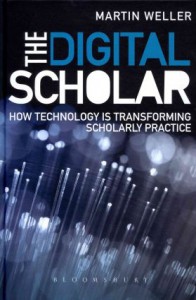 Hard to believe that our week in thinking and processing and learning and discussing digital scholarship has come to a close. In many ways, I feel I have just scratched the surface of this area, and am beginning to appreciate how the facilitators of the #change11 MOOC scheduled this in such a rapid manner to give sufficient taste of different topics, with individual freedom to stop and spend more or less time with a topic as we are moved to.
Hard to believe that our week in thinking and processing and learning and discussing digital scholarship has come to a close. In many ways, I feel I have just scratched the surface of this area, and am beginning to appreciate how the facilitators of the #change11 MOOC scheduled this in such a rapid manner to give sufficient taste of different topics, with individual freedom to stop and spend more or less time with a topic as we are moved to.
With enough of a taste of digital scholarship, I fully think I will revisit this area and new verbiage I am acquiring.
I read some chunks of the session facilitator Martin Weller’s new text The Digital Scholar (available for free online), though think the content is such that I need to see the book in a more holistic manner (and thus pre-ordered it on Amazon). During the session, I asked Martin a question at the end of his presentation:
Can you clarify how “digital scholarship” fits with or is different from Internet Research and TEL? In other words, to what extent is this term becoming more widely known/ how does it fit into a traditional disciplines?
To give some background to this question, I am working on a PhD in E-Research and Technology Enhanced Learning at Lancaster University, and have been searching for some term to capture many of the keywords I selected for my public profile at Lancaster University, where I study in the Graduate School Faculty of Arts and Social Sciences. That, in light of my blog by-line “Educational Research + (Virtual) Identity in Postmodernity,” makes me wonder if digital scholarship as a term may be something that I incorporate into my own developing research identity?
Perhaps it may come into my professional and academic work once I finish my formal studies? Only time will tell.